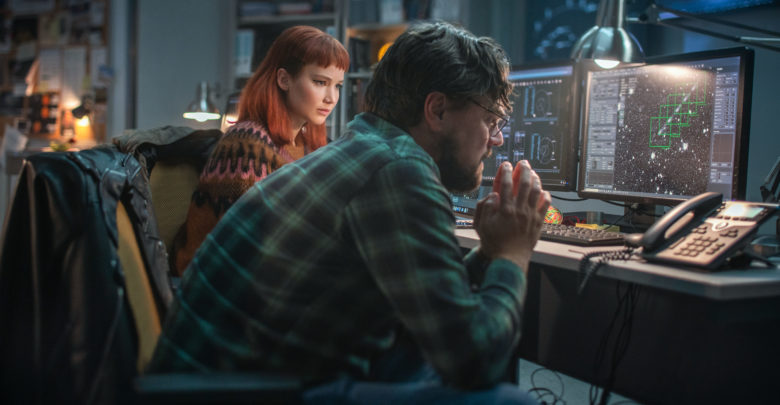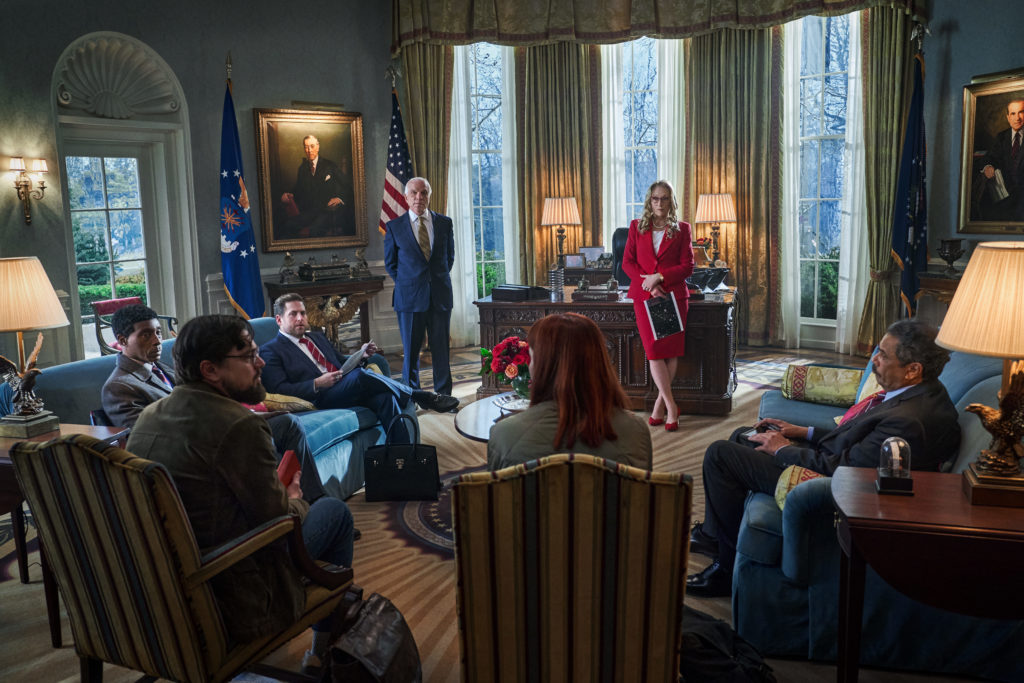Movie Review: Don’t Look Up
Don't Look Up uses dark comedy to send a message about the importance of listening to science and taking action.
 NIKO TAVERNISE/NETFLIX
NIKO TAVERNISE/NETFLIXIn Netflix’s newest star-studded project, Don’t Look Up, viewers are hit with more than a six to nine km-wide impending comet.
Don’t Look Up tells the story of Michigan State University astronomy professor, Randall Mindy (Leonardo DiCaprio), and his doctoral student, Kate Dibiasky (Jennifer Lawrence), as they discover a comet hurtling towards the earth and attempt to convince the rest of the planet to care enough to stop it. In their path to do so, they discover there’s more to trying to convince the media and the government than warning everyone about certain death for the entire planet.
Sitting at exactly 141 minutes long, the film is certainly lengthy. However, it doesn’t drag on, and jumps into the main events of the plot very quickly — a welcome relief. The discovery of the comet, dubbed “Comet Dibiasky,” happens before the 10-minute mark, and viewers are immediately pulled into a quickly-developing panic about the situation.
The film suffers from an American-centric view of the situation. It’s hard to believe that only the United States has enough resources and skilled academics to stop this huge comet when the rest of the world exists. The film does bring up the fact that other powerhouse nations like China and Russia are working together to destroy the comet as well, but it proves unsuccessful; it’s hard to believe because there’s a plethora of technology-savvy Asian nations like Japan and South Korea who the film also give a nod to, but are never brought up again.
However, Adam McKay, director and writer for the film, acknowledges that though the film may focus on the U.S., the issues are those that affect nations globally — albeit at a much smaller scale.
“We tried to put global elements into the movie, and…the things that are going on in America tend to be an extreme version, but they are happening in a lot of places,” McKay said. “There seems to be this misinformation — information warfare virus — that’s going around the world right now, so I would argue that America’s the ‘patient zero’ of what’s happening around the world.”
“I joke with my friends — one of the main exports of America right now tends to be really nuanced, well-thought-out fraud. It’s American-centric, but if you talk to people from around the world…you’ve definitely got a little bit of what we’re dealing with.”
Amy Mainzer, science advisor for the film, added that the lack of international unity also contributes to the outcome of Don’t Look Up. Mainzer is also principal investigator for NASA’s Near Earth Object Wide-field Infrared Survey Explorer mission, which studies objects like comets and asteroids coming towards the earth.
“The film touches a little bit on the notion that these are global commons’ problems, and if you focus on only one country, you can’t solve it,” Mainzer said.
“These big, giant global problems require [the involvement of] everybody internationally and you can see the failings of that process to really engage with the international community in the movie.”
This focus on the U.S. leaves something to be desired, but the quickly-changing events of the film do a good job of distracting viewers from that thought.
Much like Kate’s uneven eyeliner and box-dyed red mullet, the film is unique and quirky — something that gives it that Black Mirror apocalyptic-satirical feel, but with the humour around corruption reminiscent of Boots Riley’s towards race relations in Sorry to Bother You. Don’t Look Up has its own distinct character. Which other movie would feature an Ariana Grande original song with a Kid Cudi rap break? Additionally, the film uses a lot of montages, but it also has prominent typography throughout, a style choice that magnifies its satirical comedy.
The film’s clever one-liners enhance the viewing experience, providing momentary comedy relief before jumping back into serious topics, but it doesn’t forget to touch on important topics. Prominent themes in Don’t Look Up include government incompetency and corruption, political division, consequences of reckless capitalism, and individual susceptibility to corruption. These themes are explored quite heavily through a mix of dread-filled tension and humour, but they are fleshed out by the cast’s performances.
No single villain exists in the film but the amalgamation of villainy is brought to life by cast members who become truly hateable. President Orlean (Meryl Streep) is a delightful caricature exaggerating all the things that make bad politicians truly bad, Peter Isherwell (Mark Rylance) is a greedy billionaire, and Jason Orlean (Jonah Hill) is a nepotism baby throwing around the same slang that Kate and Yule (Timothée Chalamet) use — but worse, because he’s a political figure.

By combining these hilariously-evil villains and flawed but righteous protagonists, Don’t Look Up presents a serious reflection of real-life issues affecting democracies everywhere.
It’s clear that Comet Dibiasky is more than a comet in real life; it’s another issue coming closer at impossible speeds right in front of our faces — climate change.
The government’s bend-over-backwards attitude to Isherwell’s phone company proposing that an economic boom may be gained by letting pieces of the comet hit the earth, the dismissal by satirized conservatives of the existence of the comet, and the deplatforming of prominent young activists and scientists parallels a real-life issue.
This interpretation was reaffirmed by McKay, who discussed the inaction and numbness towards climate change.
“I don’t think it’s any big spoiler alert that the movie’s really about the climate crisis,” McKay said. “I think we’re seeing it play out in natural time. I have friends who are in broadcast media — they’ll tell you — they’re reticent to deal with the climate crisis which empirically speaking…is probably the biggest threat to life in the history of mankind, and it’s happening now.”
“It’s definitely inspired by that — the fact that we know the livable atmosphere is collapsing, and yet this pre-set economy of information just chugs along.”
If the movie is a metaphor about climate change, then how does it end? Without giving away too much, I’d say it’s a happy ending for everyone. It certainly doesn’t follow movie clichés, and you should make sure to stay the extra minute after initial credits to watch the final scene.
“It’s really important for folks to recognize that we can take meaningful actions to prevent the worst outcomes of climate change, and that’s also part of this movie,” Mainzer said. “It’s a wakeup call for folks to really heed what scientists are saying about climate change and other topics that affect us, like the pandemic.”
“It really is important that we make decisions rooted in the best possible science and that we try to live and govern accordingly.”
Additionally, McKay spoke about the use of dark comedy as a means to get across a serious message.
“We really felt like the comedy could bridge some of the divide — this artificial divide that’s sort of created in our countries,” McKay said. “Big capital can make a lot of money and rip us off, so laughter is one of those ways that bridges that. You can’t fake real laughter.”
Mainzer added that the message of this movie is one that’s hopeful behind the satirical front face the movie puts on.
“If we can laugh at ourselves a little bit and recognize our own foibles and our own shared humanity, it lets us get over ourselves and get past some of these artificial divisions and get down to figuring out ‘how do we actually solve the problems together?’” Mainzer said.
“That’s — for me — what really does it for this movie; it’s going to make you laugh. Hopefully it’ll make you think and the message is that the future really is up to us. If we choose to go out and tackle some of these tough challenges about climate change and all these other issues that face us, we actually can have a better outcome if we choose it.”
Don’t Look Up is available in theatres on December 10 and on Netflix on December 24.




